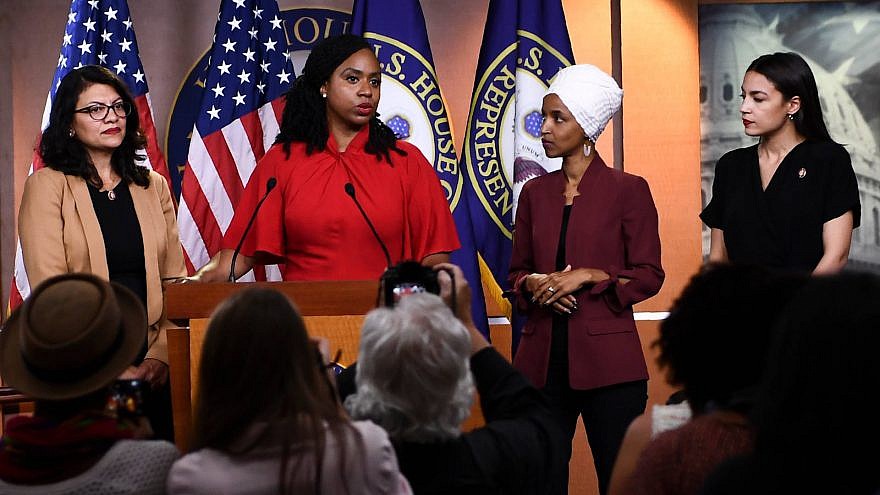Conflicting Ideals: Mixed Reactions to Israel barring Reps. Omar and Tlaib

From left: Reps. Rashida Tlaib (D-Mich.), Ayanna Pressley (D-Mass.), Ilhan Omar (D-Minn.) and Alexandria Ocasio-Cortez (D-N.Y.). Photo courtesy JNS.
The battle over whether Israel should have allowed a visit to the territories by United States Representatives Ilhan Omar and Rashida Tlaib came down to competing ideals.
On one side, it is argued that Israel is a strong democracy that can withstand even hostile, press-seeking visitors, and has nothing to hide. Barring a visit would play into their hands and make them a martyr for the boycott-Israel cause.
The other argument is that this was nowhere near a true fact-finding mission, but a media spectacle with an anti-Israel agenda, and Israel has the right, as does any country, to determine who comes in and under what circumstances.
President Donald Trump had urged Israel to not let the representatives in, and the announcement was made just hours later on Aug. 15, but Ron Dermer, Israel’s ambassador to the United States, said the ban was Israel’s decision and “we were not pressured by the Trump administration.”
Last month, Dermer had issued a statement saying the two would be allowed to visit “out of respect for the U.S. Congress, and the great alliance between Israel and America.”
The decision to bar the representatives from their planned Aug. 18 visit met with mixed reaction, with many stalwart supporters of Israel saying it was a bad move, while others hailed the decision.
The American Israel Public Affairs Committee tweeted its criticism of the decision, though at the AIPAC Policy Conference in March, Omar and Tlaib were decidedly unpopular figures.
While AIPAC disagrees “with Reps. Omar and Tlaib’s support for the anti-Israel and anti-peace BDS movement, along with Rep. Tlaib’s calls for a one-state solution,” the tweet said, “we also believe every member of Congress should be able to visit and experience our democratic ally Israel firsthand.”
One day after the announcement that the trip was off, Israel’s interior minister, Aryeh Deri, approved a request by Tlaib to enter the country so she could visit her elderly grandmother. In her request, she said the trip would be “to visit my relatives, and specifically my grandmother, who is in her 90s and lives in Beit Ur al-Fouqa. This could be my last opportunity to see her. I will respect any restrictions and will not promote boycotts against Israel during my visit.”
(Update: On Aug. 16, Tlaib said she would not visit her grandmother after all, because of Israel’s “oppressive conditions. ” She said “silencing me and treating me like a criminal is not what she wants for me. It would kill a piece of me.”)
The original trip for Omar and Tlaib was being organized by Miftah, an organization chaired by PLO Executive Committee member Hanan Ashrawi. Three months ago, Ashrawi had been barred from entering the United States.
Miftah is a strong supporter of the boycott-Israel movement, and refers to terrorists as resistance fighters. For example, its website refers to Wafa Idrees as joining “the ranks of the resistance movement.” She killed an 81-year-old Israeli and wounded 150 others in a 2002 suicide bombing.
On its website, Miftah routinely accuses Israel of “ethnic cleansing” of Arabs, and denies Jewish history in Jerusalem, saying the “narrative” of a Jewish Temple is political and erases “thousands of years of Muslim significance.
The site has also promoted blood libels against Jews, claiming that Israel steals organs from Palestinians, and has abducted Ukrainian and Haitian children to steal their organs.
The itinerary for Omar and Tlaib included visits to Jerusalem, Bethlehem, Ramallah and Hebron.
Among the itinerary items was a visit to the Temple Mount, which earlier that week had been the site of clashes as Muslims rioted to try and prevent Jews from visiting on Tisha B’Av, and there were concerns that their visit would add to the volatility.
Jonathan Greenblatt, CEO of the Anti-Defamation League, said “a good-faith visit to Israel is the best way to be exposed to its democracy, complexities and range of views. And so while we absolutely disagree with the pro-BDS positions of Reps. Omar and Tlaib, keeping them out is counterproductive.”
But some, including Prime Minister Benjamin Netanyahu, pointed out that the trip’s agenda was anything but a good-faith visit.
When Israel received the planned itinerary just a few days earlier, Netanyahu said it “revealed that they planned a visit whose sole objective is to strengthen the boycott against us and deny Israel’s legitimacy.”
The trip was billed as a visit to Palestine, not to Israel, and unlike all other visits by Democratic and Republican representatives, there were no requests to meet with any official Israeli representatives, whether in the ruling coalition or the opposition.
Others noted that 72 members of Congress — 41 Democrats and 31 Republicans — had just traveled to Israel, meeting with Israeli government officials and Palestinian officials, even with Palestinian Authority President Mahmoud Abbas, so if Omar and Tlaib were truly on a fact-finding mission, they would have gone on that type of trip.
David Harris, CEO of the American Jewish Committee, said “the failure of the legislators to include any Israeli perspectives whatsoever reveals this to have been not a fact-finding mission, but rather a propaganda exercise… they were not coming to hear from various points of view, but rather to undermine the very legitimacy of the State of Israel.”
Nevertheless, the AJC said “out of two less-than-ideal options, neither of which was risk-free, Israel did not choose wisely” in barring the representatives, as the cost of doing so “may prove even higher than the alternative.”
David Friedman, the U.S. ambassador to Israel, said Israel’s initial acceptance of the visit by Tlaib and Omar was seen as a chance to “engage with and educate the delegation members with regard to Israel’s vibrant and robust democracy, its religious tolerance and its ethnic diversity,” but the actual itinerary “leaves no room for that opportunity.”
He said Israel “has every right to protect its borders in the same manner as it would bar entrants with more conventional weapons.”
The Conference of Presidents of Major American Jewish Organizations, an umbrella group of 53 organizations, held a conference call with Israel’s Ambassador to the United States, Ron Dermer. “Many of the organizations expressed disagreement with the government’s decision and expressed concern that it will be exploited by pro-BDS and other critics of Israel, while several others expressed support,” a statement said.
The Conference noted that members of Congress who are critical of Israel had been welcomed in the past and accepted opportunities to explore “all of the issues openly and frankly,” something of which Omar and Tlaib “had no such intention.”
The Conference’s statement concluded with the hope that “bipartisan support demonstrated by the recent trips of members of Congress to Israel and the passage by overwhelming majorities of pro-Israel measures will continue unabated and bipartisan support for the US-Israel special relationship will be strengthened.”
The Jewish Federations of North America said “every member of Congress, without exception, should be allowed to visit Israel, irrespective of whether we agree with their point of view. The relationship between Israel and the U.S. Congress is longstanding and unique, and has served as the bulwark of America’s bi-partisan support for Israel for decades.”
The Zionist Organization of America hailed the decision, saying “Israel should not enable a visit that will give Tlaib and Omar opportunities to propagandize for Israel’s destruction, incite anti-Jewish violence, and perhaps even use the visit for other nefarious purposes.”
The ZOA also pointed out that the U.S. has barred entry to foreign dignitaries, from allies to enemies. In 1986, the U.S. barred Austria’s president and former Secretary General of the United Nations, Kurt Waldheim, when his Nazi past was uncovered.
Similarly, in April the U.S. banned Omar Barghouti, co-founder of the BDS movement, who calls for Israel’s destruction.
In 2012, the U.S. also refused to admit a member of Israel’s government. Knesset Member Michael Ben Ari was denied entry because he was part of the Kach organization, which has been accused of racism and anti-Arab incitement. This March, the Israeli Supreme Court barred him from running for the Knesset.
Laurie Cardoza-Moore of Proclaiming Justice to the Nations said Netanyahu “stood on the right side of history” by barring Omar and Tlaib. “Now is the time for the American people to stand up and speak out against these dangerous women who openly flaunt their connections to the Muslim Brotherhood and its affiliates,” said Cardoza-Moore. Earlier this year, her organization launched a petition drive to have them ousted from Congress.
Tzipi Hotovely, Israel’s deputy foreign minister, said Israel “won’t allow those who deny our right to exist in this world to enter Israel.”
Netanyahu pointed out that Israeli law “prohibits the entry into Israel of those who call for and work to impose boycotts on Israel, as do other democracies that prohibit the entry of people who seek to harm the country.”
In 2017, Israel barred entry of two members of the European Parliament who were active supporters of the BDS movement.
In response to the cancellation, Omar accused Israel of implementing Trump’s “Muslim ban” and said denying entry “not only limits our ability to learn from Israelis, but also to enter the Palestinian territories.”
She accused Netanyahu of limiting “public knowledge of the brutal realities of the occupation” and aligning himself “with Islamophobes like Donald Trump.”
Meanwhile, there are still over a dozen Arab nations where anyone holding an Israeli passport or, in some cases, a different passport with an entry stamp from a visit to Israel, is barred from entering.


